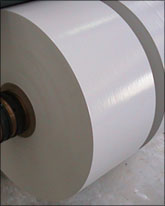Paper sector wants the aggregate GST levies by the Centre and State to not exceed 6 per cent.
 The global paper demand suffered very badly during the global recession. Due to recessionary tendencies in advanced markets of America and in Europe, there was a contraction in demand for paper.
The global paper demand suffered very badly during the global recession. Due to recessionary tendencies in advanced markets of America and in Europe, there was a contraction in demand for paper.
This contraction in demand has lead to huge inventory pile-up and a sharp fall in prices in international market.
As a result, the countries like China, Indonesia, Finland, Sweden, Germany and the have US started to export their product to countries like India, where the demand continues to grow. This has affected the Indian paper manufacture.
Over the period 2007-08 to 2008-09, import of coated paper and boards has increased by 70% in volume terms, which has eroded the profitability of domestic paper producers.
Of late, there is improvement in the Northern Bleached Softwood Kraft pulp prices hardened by about 31% from $635 per tonne in May 2009 to $830 per tonne by November -- December 2009.
While demand from China was powering the pulp prices hitherto, there is fatigue with 44% fall in NBSK pulp imports into China from June 2009 levels. Still, the global players are hopeful that the NBSK pulp prices may not fall substantially in the next few months factoring in relatively lower inventories in many other regions and recovery in the global economy leading to improving demand.
Factoring in all these, BMO Capital markets has indicated that NBSK pulp prices averaged at $718 in 2009 can harden to $795 per tonne in 2010, which can ease slightly to $790 per tonne in 2011.
As capacities increase in India, the country may have to ship out excess production. In this context the recovery in global pulp and paper prices have come as a welcome breather. But sharp appreciation of rupee has dampened the export realizations.
Industry expectations
The paper market is flooded with imports of a large quantity of coated and un-coated paper. Also, the slow down in GDP growth has also affected the pace of growth in demand for paper. As such, to revive growth and to safe guard itself from import papers, industry expects:
- The custom duty should be maintain atleast at the current level of 10% for paper and paperboard.
- Irrespective of whether the country opts for one combined GST rate for Centre and States or the dual GST, the paper industry wants the government to ensure that there is a unified base and one set of rules for GST providing seamless input tax credit across the supply chain.
- Under GST regime, the aggregate GST levies by the Centre and State should not exceed 6% for the paper and paperboard.
- The industry requires allocation of Rs 400 crore as interest subsidy under Technology Upgradation Fund (TUF) Scheme.
- The Industry wants unutilized Cenvat balances to be refunded within 30 days of application or be allowed to transfer the credit to any other unit of the organization, respective whether or not it is engaged in manufacture of paper or paper board.
- The industry wants duty free import of all the raw materials including chemicals that may be required for the manufacture of Elemental Chlorine Free (ECF) or better pulp. It also seeks excise duty exemption for the final product manufactured using ECF or better technology and higher income tax depreciation for the ECF or better pulp plants.
- Withdrawal of the levy of electricity duty on captive power generation.
- Zero duty on import of coal to meet shortage both in quality/quantity of coal available domestically.
- Relief under section 80HHC (i.e. relief made available to the exporters under the erstwhile provision of the income-tax Act) may be reintroduced to keep the exporters afloat in a competitive global market place.
- Handmade paper used for printing educational textbook is exempted from central excise. As this paper is not at all used for printing educational textbook, this should be amended to printing and writing paper of all kind.
Analysts/market expectations
The partial roll back of fiscal stimulus may mean hike in excise duties. This should impact the supplies to printing and writing segment. But we donot expect any major announcement specifically for the paper industry.
Stock to watch
Ballarpur Industries, West Coast Paper Mills, Tamil Nadu Newsprint & Papers and JK Paper
Outlook
The improving domestic demand and the rise in global prices together should help paper industry to perform better in Calendar Year 2010. The industry was suffering from overcapacity, low demand and competition from cheap imports. The market is tough due to over supply, especially in the writing and printing category.
While new capacity expansions come on stream can aggravate domestic over-capacity, but the recent uptrend in global prices can help step up exports. Also, shortly demand for supplies to education segment will surge. The recovery in the global economy and the buoyancy in the domestic economy mean better demand growth for paper, but players with expansions in/to be in place will have to find lucrative and niche export markets to ensure that the surpluses are exported.
Union Budget 2010-11 is likely to partially hike excise duties, which can impact realizations in the printing and writing paper segment. But any announcements on increased outlay for education should augur well. Overall, Union Budget 2010-11 is likely to be neutral for the paper sector.





